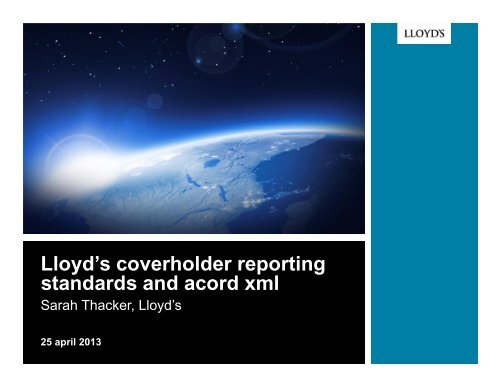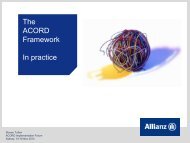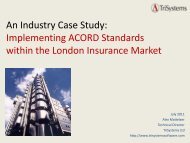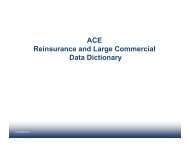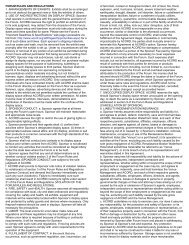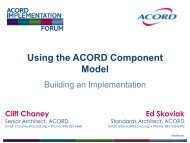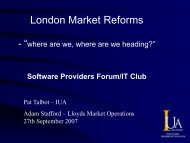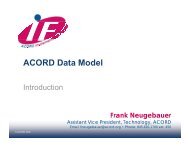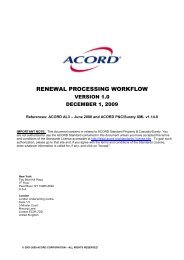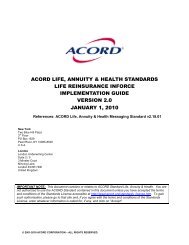XML for Binding Authorities - Acord
XML for Binding Authorities - Acord
XML for Binding Authorities - Acord
Create successful ePaper yourself
Turn your PDF publications into a flip-book with our unique Google optimized e-Paper software.
Picture to go here ><br />
Lloyd’s coverholder reporting<br />
standards and acord xml<br />
Sarah Thacker, Lloyd’s<br />
25 april 2013<br />
© Lloyd’s
The business problem<br />
► Coverholders typically<br />
work with more than one<br />
syndicate.<br />
► Each syndicate asks <strong>for</strong><br />
different data.<br />
► Coverholders have<br />
additional costs, time and<br />
ef<strong>for</strong>t to meet all the<br />
requirements.<br />
► The originating retail<br />
agent did not know the<br />
key in<strong>for</strong>mation they<br />
needed to capture so it<br />
could not be passed up<br />
the chain anyway.<br />
► Key in<strong>for</strong>mation to run risk<br />
models is missing.<br />
► Tax and regulatory<br />
requirements cannot be<br />
met.<br />
► Premiums cannot be<br />
processed without<br />
minimal details.<br />
► Claims cannot be<br />
managed properly as<br />
in<strong>for</strong>mation is missing.<br />
► Basic in<strong>for</strong>mation about<br />
the coverholder or the<br />
contract is missing.<br />
<<br />
Picture<br />
to<br />
go here<br />
><br />
© Lloyd’s
Lloyd’s<br />
objectives<br />
► To make it easier <strong>for</strong> coverholders to<br />
work with London.<br />
► Better in<strong>for</strong>mation into London.<br />
► Improve process efficiencies and<br />
enable greater use of technology.<br />
<<br />
Picture<br />
to<br />
go here<br />
><br />
© Lloyd’s
Lloyd’s vision<br />
<strong>for</strong><br />
coverholder<br />
data<br />
processing<br />
(2010)<br />
To standardise the flows of risk, premium,<br />
claim and accounting in<strong>for</strong>mation between<br />
coverholders and the Lloyd's market by<br />
working with market participants and<br />
ACORD to agree data standards which<br />
can be used both within and outside the<br />
Lloyd's market.<br />
<<br />
Picture<br />
to<br />
go here<br />
><br />
© Lloyd’s
No more bordereaux<br />
The coverholder keys<br />
in<strong>for</strong>mation about the<br />
risk, premium or<br />
claim into their own<br />
system<br />
<<br />
Picture<br />
to<br />
go here<br />
><br />
The computer<br />
automatically sends<br />
the in<strong>for</strong>mation to<br />
your system in<br />
London<br />
© Lloyd’s
No more manual data manipulation<br />
► The system does the work<br />
Validates<br />
data<br />
<br />
<br />
<br />
Stores<br />
data<br />
Analyses and<br />
reports on<br />
data<br />
© Lloyd’s
No more<br />
differing<br />
<strong>for</strong>mats and<br />
layouts<br />
The system presents all the in<strong>for</strong>mation<br />
from all the coverholders to you in a<br />
consistent way.<br />
► Dashboards<br />
► Screens designed <strong>for</strong> you<br />
► Paper reports<br />
<<br />
Picture<br />
to<br />
go here<br />
><br />
© Lloyd’s
Lloyd’s introduced<br />
coverholder reporting<br />
standards<br />
<strong>for</strong> premiums, claims<br />
and US property<br />
exposures; these state the<br />
in<strong>for</strong>mation to provide<br />
< Picture to<br />
go here ><br />
www.lloyds.com/<br />
coverholderreportingstandards<br />
© Lloyd’s
Reporting standards<br />
<<br />
Picture<br />
to<br />
go here<br />
><br />
www.lloyds.com/coverholderreportingstandards<br />
© Lloyd’s<br />
© Lloyd’s 2013
Tools to<br />
help you<br />
Failure to identify the correct territories <strong>for</strong><br />
regulatory and tax purposes may lead to:<br />
► delays in premium processing<br />
► invalid insurance contracts<br />
► inaccurate regulatory reporting and funding<br />
► incorrect tax returns and tax payments<br />
► insured’s, intermediaries or underwriters<br />
subjected to fines<br />
► damage to Lloyd’s international reputation<br />
► All parties in the placement chain should<br />
comply with regulatory and tax obligations<br />
www.lloyds.com/crystal<br />
© Lloyd’s<br />
© Lloyd’s 2013
Picture to<br />
go here ><br />
But alone<br />
lloyd’s<br />
reporting<br />
standards do<br />
not solve all the<br />
problems<br />
< Picture to<br />
go here ><br />
© Lloyd’s
differing <strong>for</strong>mats and the need <strong>for</strong><br />
manual intervention<br />
► In<strong>for</strong>mation received as<br />
an unstructured PDF, on<br />
paper or in some other<br />
<strong>for</strong>mat which means it is<br />
not useful.<br />
► In<strong>for</strong>mation in a<br />
spreadsheet but it is<br />
unclear what each column<br />
contains.<br />
► Columns have been<br />
added or deleted since<br />
last month and<br />
processing cannot be<br />
automated.<br />
► Submissions rarely look<br />
the same.<br />
► The coverholder does not<br />
want to be given yet<br />
another system.<br />
► Complex requirements<br />
such as multiple taxes<br />
and requirements <strong>for</strong><br />
different risk locations<br />
make arriving at a<br />
standard spreadsheet<br />
almost impossible.<br />
► Manual re-keying at<br />
coverholders and in<br />
London.<br />
<<br />
Picture<br />
to<br />
go here<br />
><br />
© Lloyd’s
A common<br />
<strong>for</strong>mat<br />
► ACORD <strong>XML</strong> provides a consistent<br />
<strong>for</strong>mat.<br />
► Standard, simpler in<strong>for</strong>mation flows.<br />
► In<strong>for</strong>mation can pass from system to<br />
system no need <strong>for</strong> re-keying.<br />
► Coverholders, brokers and syndicates<br />
are free to use their own systems and<br />
technologies.<br />
<<br />
Picture<br />
to<br />
go here<br />
><br />
© Lloyd’s
© Lloyd’s
ACORD bound risks<br />
standard<br />
• Worked with Lloyd’s<br />
and ACORD<br />
membership to create<br />
• Property risks reporting<br />
spreadsheet standard<br />
• <strong>XML</strong> message<br />
equivalent<br />
• Done as part of wider<br />
exposure reporting<br />
working group<br />
© ACORD 2013
Premium and Claims –<br />
started with Lloyd’s<br />
template<br />
• Lloyd’s has published<br />
• Premium and Claims<br />
spreadsheet template<br />
• Guide to using them<br />
• Content driven by<br />
regulatory reporting<br />
requirements<br />
• Data in the templates<br />
fulfills requirements <strong>for</strong><br />
reporting back to<br />
country/state of origin<br />
© ACORD 2013
Why Binders Are Important<br />
• Coverholder business is significant part of<br />
Lloyd’s business<br />
• From USA (surplus lines market)<br />
• From UK / elsewhere (all types of risks)<br />
• For reporting risks bound and premium/ claim<br />
transactions<br />
• Carrier review<br />
• Lloyd’s receives data <strong>for</strong> regulatory returns they make on<br />
behalf of syndicates back to countries of origin<br />
• London one of the biggest USA surplus lines<br />
carriers<br />
© ACORD 2013
Some views from MGA/TPA’s<br />
• Excess and Surplus lines Joint Working<br />
Group (ACORD/AAMGA/ACT/NAPSLO)<br />
met last October<br />
• In a dedicated session two members of<br />
that group presented views regarding<br />
the value of the premium and claim<br />
standards<br />
© ACORD 2013
MGA Viewpoint<br />
• Differences between US market and<br />
London Market<br />
• Different data and <strong>for</strong>mat requirements<br />
by broker(s)<br />
• Processing time to submit to London<br />
© ACORD 2013
Premium processing<br />
Most Surplus Lines carriers are paid monthly by<br />
the MGA Account Current Statement<br />
© ACORD 2013
• Premium process<br />
• Coverholder sends details of premium transactions to broker<br />
• Broker sends this to Xchanging (3 rd party provider) and carriers<br />
• Xchanging provides in<strong>for</strong>mation to Lloyd’s <strong>for</strong> regulatory<br />
reporting<br />
© ACORD 2013
London Market<br />
• Data requirements vary<br />
• Processing time to submit monthly reports<br />
• Processing of Payment<br />
Sample Report<br />
© ACORD 2013
Requirements <strong>for</strong> Claims Reporting<br />
• Most USA surplus lines carriers receive a direct feed – daily, monthly, weekly<br />
• Funding comes in <strong>for</strong> monthly total<br />
• So its simple <strong>for</strong> USA – payment of total amount in 15 days<br />
• Harder <strong>for</strong> London where pay later and split by year a/c<br />
• Data requirements have become more detailed (feedback into u/w process)<br />
• Data <strong>for</strong>mats required by carriers all different layouts<br />
Report<br />
Coding<br />
Monthly<br />
Funding<br />
Monthly<br />
Feed<br />
© ACORD 2013
• Claim process<br />
• Coverholder or TPA reports claims to broker<br />
• Broker sends this to Xchanging (3 rd party provider) and carrier/s<br />
• Xchanging provides in<strong>for</strong>mation to Lloyd’s <strong>for</strong> regulatory<br />
reporting<br />
© ACORD 2013
Some specific benefits <strong>for</strong> claims in<br />
dealing with London<br />
• Shorten collection times<br />
<strong>for</strong> various bordereau<br />
• Uni<strong>for</strong>mity <strong>for</strong> auditing<br />
purposes<br />
• Improve burdensome<br />
processes that are already<br />
in place due to lack of one<br />
standard<br />
© ACORD 2013
Summary of benefits of a consistent<br />
standard from an MGA/TPA<br />
Perspective?<br />
© ACORD 2013
Where are we?<br />
Three new <strong>XML</strong> messages<br />
1. <strong>XML</strong> Property bounds risks report (ER3001)<br />
2. Premium transaction report<br />
3. Claim transaction report<br />
*** Challenge now is implementation ***<br />
© ACORD 2013
Demystifying <strong>XML</strong><br />
Kirstin Duffield, Morning Data Ltd
Working Group<br />
BAS<br />
S<br />
Coverholder<br />
Vendor<br />
Morning<br />
Data<br />
EIS<br />
Wholesale Broker<br />
AC<br />
E<br />
UW / Syndicate
Unit Size What It Means<br />
Bit (b) 1 or 0 A binary digit (1 or 0). The foundation of all computing.<br />
Byte (B) 8 bits 1 byte = 1 letter or number of the English language.<br />
Kilobyte (KB) 1,000 bytes From "thousand" in Greek.<br />
Megabyte (MB) 1,000 KB From "large" in Greek. The complete works of Shakespeare totals 5MB.<br />
Gigabyte (GB) 1,000 MB From "giant" in Greek. A two hour film equals 1-2GB.<br />
Terabyte (TB) 1,000 GB From "monster" in Greek.<br />
Petabyte (PB) 1,000 TB or 1,000,000 GB All letters delivered by the US Postal Service in a year amounts to 5PB.<br />
Exabyte (EB) 1,000 PB or 1,000,000,000 GB Equivalent to 10 billion copies of TIME magazine.<br />
Zettabyte (ZB) 1,000 EB or 1,000,000,000,000 GB Total amount of data in existence in 2010 was 1.2ZB.<br />
Yottabyte (YB) 1,000 YB or 1,000,000,000,000,000 GB Currently too big to imagine.<br />
They call it “Big data” <strong>for</strong> a reason
Since The World’s the beginning Data Storage of time… (in EB)
Understanding <strong>XML</strong><br />
Phil Collins, Morning Data Ltd
What is <strong>XML</strong>?<br />
› Text with structure<br />
› Sole purpose is to carry data<br />
› Solution to War on Keystrokes<br />
› Breaks language barriers<br />
› Promotes standardisation<br />
› Built-in validation<br />
› Non-ambiguous<br />
› Readable
What’s wrong with CSV?<br />
› No structure<br />
› No validation<br />
› Difficult to read<br />
› Very ambiguous<br />
› Easy to make mistakes<br />
› Single language<br />
› Flat, single-level data
A cupcake recipe in CSV <strong>for</strong>mat.
I guess it’s still edible.
The<br />
same<br />
recipe<br />
in <strong>XML</strong>
<strong>XML</strong> can adapt.
It’s all just data.
So much data, so little time.
Descriptive and<br />
easy to validate.
<strong>XML</strong> is built to carry data.
How <strong>XML</strong> can Improve<br />
Efficiency and Profitability<br />
<strong>for</strong> MGAs and Companies<br />
Chance Gilliland, ASLI<br />
ACE Syndicate<br />
Lloyd’s of London
6 Pillars of Data<br />
1) Data Management<br />
2) Reporting<br />
3) Data Analysis<br />
4) Data Modelling<br />
5) Fast Data<br />
6) Big Data<br />
Where MGAs need to be<br />
Experts<br />
Where Companies<br />
need to be Experts<br />
So how can <strong>XML</strong> help improve Efficiency and<br />
Profitability <strong>for</strong> MGAs and Companies?
Data Management<br />
and Reporting with <strong>XML</strong><br />
MGA Company Benefits?<br />
Less time compiling<br />
spreadsheets.<br />
More efficient data<br />
capture and data<br />
management with <strong>XML</strong><br />
More efficient data<br />
transfer with <strong>XML</strong><br />
Less time spent<br />
chasing/scrubbing data<br />
Better Data Quality<br />
Data received Faster<br />
Improved Profitability<br />
and Efficiency
Data Analysis and<br />
Modelling with <strong>XML</strong><br />
Company MGA Benefits?<br />
More time can be spent<br />
on value-added analysis<br />
to improve profitability<br />
MGAs will benefit from<br />
improved carrier<br />
profitability, which will lead<br />
to improve MGA<br />
profitability<br />
Improved Profitability<br />
and Efficiency<br />
More efficiency, more profitability!
How <strong>XML</strong> can Improve<br />
Efficiency and Profitability<br />
<strong>for</strong> MGAs and Companies<br />
• More efficiency in the reporting and transfer process<br />
• More time can be spent on value-added analysis to<br />
drive profitability<br />
• Saves time, energy, and money <strong>for</strong> everyone


